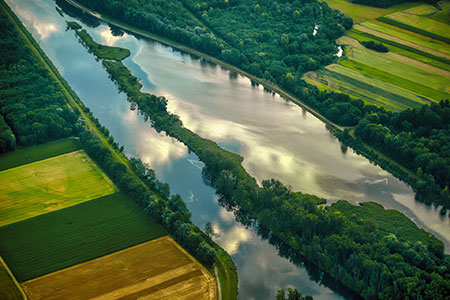
We focus on four core themes that bring together people across disciplines and across sectors
Our Research & Innovation Themes
We focus on four core themes that bring together people across disciplines and across sectors.

Net-zero carbon
To avoid the worst impacts of climate change, global greenhouse gas emissions must reach net-zero by 2050.

Nature-based solutions
Working with, protecting and enhancing nature we can create win-wins that deliver healthy ecosystems and thriving communities and economies.

Circular solutions
The market for circular innovations where waste is designed out and materials are kept in use for longer grows with the rising need for tackling climate change, reducing environmental harms and alleviating resource constraints.

Enabling eco-innovation
At the Centre for Global Eco-Innovation, we are not only interested in developing the solution, but also finding innovative scalable means for supporting eco-innovation.
Tab Content: Our net-zero carbon projects
Achieving the net-zero carbon by 2050 target requires innovation across sectors in every part of our economies and societies. At the Centre for Global Eco-innovation we are committed to supporting net-zero carbon innovation, bringing together interdisciplinary expertise at Lancaster University and working closely with businesses, organisations and institutions.
We have active projects relating to emissions reduction and negative emissions.
Example projects:
- Eco-I North West is a £14m research and innovation project part-funded by the European Regional Development Fund, which supports low carbon business innovations across the region. It aims to support >20 business-driven PhD projects focused on low carbon innovations drawing on expertise in chemistry, data science and digital technologies, environmental sciences, engineering, management and social sciences.
- Soil-Value is a 5-year fellowship funded by EPSRC, which focuses on developing our ability to understand, predict and invest in soil ecosystem services, including carbon sequestration. It is providing predictions of terrestrial carbon change across the UK under a variety of land use, management and climate change scenarios.
Tab Content: Our nature-based solutions
Nature-based solutions are interventions, practices, products or services that work with or enhance nature. It’s widely recognised that nature provides us with many goods and services: from clean air and water, to regulating climate and underpinning our health and culture. By working with nature, rather than against it, we can enhance the delivery of those goods and services, support thriving ecosystems, and develop a green economy. Examples include natural flood management practices, soil carbon sequestration for climate change, and green infrastructure in cities.
We can also learn from nature to create efficient, resilient and sustainable systems.
At Lancaster University we have broad expertise in environment and ecology, engineering, finance, design and health to support the development of nature-based solutions and have a number of active research projects in this area.
Example projects:
- Rurban Revolution is a 2-year Global Food Security Programme-funded project focused on the transformative power of urban farming on the health, sustainability and resilience of our food system. We explore how edible green infrastructures in cities can help support healthy diets, healthier ecosystems and more resilient food supply chains.
- Soil-Value is a 5-year EPSRC-funded fellowship focused on understanding the delivery of soil food, water and carbon services across the UK, their resilience to climate change and future land use drivers, and how to enhance these services. Through this project, we are helping inform the business case for investing in soils as a nature-based solution.
- Cropbooster-P is a Horizon 2020 project that brings together plant scientists, food system researchers and stakeholders to identify the priorities and opportunities for improving the sustainability, productivity and nutritional quality of our EU food system by improving crops.
Tab Content: Our circular solutions
The future is circular: linear business models and practices that rely on ‘take, make, use and dispose’ drive inefficiencies, environmental degradation and resource scarcity. Re-thinking how we design, manufacture, share, reuse, recycle and repurpose resources and products is essential to securing a sustainable future. It also offers opportunities for resource-use efficiency savings, future-proofing against future regulation and entering new markets.
Example projects:
- RECIRCULATE is a £7M project funded by the Global Challenges Research Fund that delivers innovative solutions to pressing problems with water use and safety through new partnership-based approaches that develop durable, equitable partnerships between African and UK researchers.
Tab Content: Our eco-innovation projects
Finding robust, adaptive and appropriate approaches to supporting eco-innovation is vital given the urgency of our environmental challenges, the pace of change in technology and the threats of disruption.
We explore a range of mechanisms: from opening up access to University expertise and facilities to supporting entrepreneurialism to helping foster place-based innovation ecosystems.
Example projects:
- Eco-I North West supports low-carbon business innovations across the region. In a time of crisis, we hope to facilitate business recovery, resilience and eco-innovation by facilitating a variety of short-term and long-term support and interventions: from capital grants for low carbon demonstrator projects to intensive R&D projects at PhD and Master's Degree to peer-to-peer workshops and platform working.
- The RECIRCULATE programme is framed around an integrated ‘escalator’ of training and research to empower and sustain research with and for the wider community in sub-Saharan Africa. It hosts a suite of capacity-building technical workshops, and residences and supports networks of entrepreneurs in addressing the UN Sustainable Development Goals.

